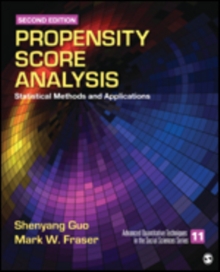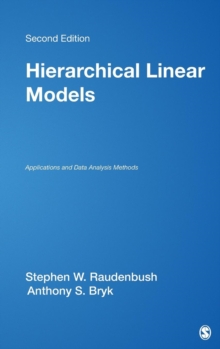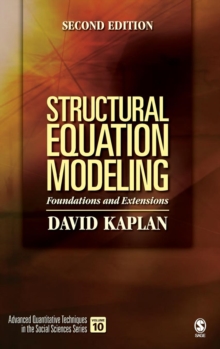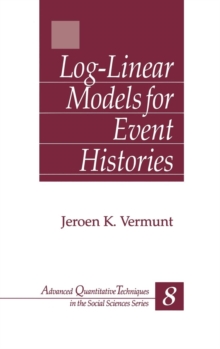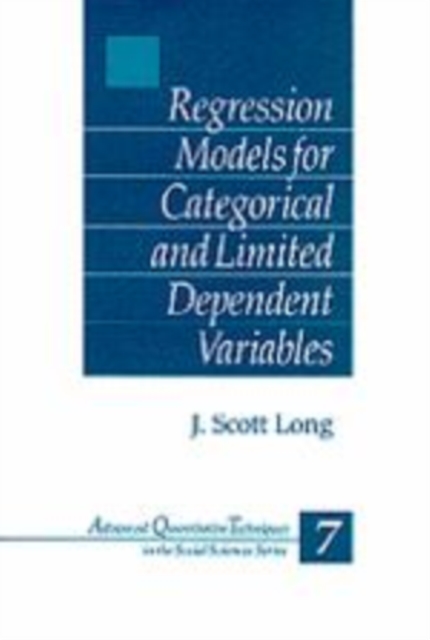
Regression Models for Categorical and Limited Dependent Variables Hardback
by John Scott Long
Part of the Advanced Quantitative Techniques in the Social Sciences series
Hardback
- Information
Description
THE APPROACH "J. Scott Long's approach is one that I highly commend. There is a decided emphasis on the application and interpretation of the specific statistical techniques.
Long works from the premise that the major difficulty with the analysis of limited and categorical dependent variables (LCDVs) is the complexity of interpreting nonlinear models, and he provides tools for interpretation that can be widely applied across the different techniques." --Robert L.
Kaufman, Sociology, Ohio State University "A thorough and comprehensive introduction to analyzing categorical and limited dependent variables from a traditional regression perspective that provides unusually clear discussions concerning estimation, identification, and the multiplicity of models available to the researcher to analyze such data." --Scott Hershberger, Psychology, University of Kansas THE ORGANIZATION "The thing that impresses me the most about this book is how organized it is.
The chapters are in excellent logical sequence. There is a useful repetition of important concepts (e.g., estimation, hypothesis testing) from chapter to chapter.
J. Scott Long has done a terrific job of organizing like things from disparate literatures, such as the scaler measures of fit in Chapter 4." --Herbert L.
Smith, Sociology, University of Pennsylvania "A major strength of the book is the way that it is organized.
The chapter about each technique is written in a highly organized and parallel format.
First the statistical basis and assumptions for the particular model are developed, then estimation issues are considered, then issues of testing and interpretation are considered, then variations and extensions are explored." --Robert L.
Kaufman, Sociology, Ohio State University FOR THE COURSE "I have been teaching a course on categorical data analysis to sociology graduate students for close to 20 years, but I have never found a book with which I was happy.
J. Scott Long's book, on the other hand, is nearly ideal for my objectives and preferences, and I expect that many other social scientists will feel the same way.
I will definitely adopt it the next time I teach the course.
It deals with the right topics in the most desirable sequence and it is clearly written." --Paul D.
Allison, Sociology, University of Pennsylvania Class-tested at two major universities and written by an award-winning teacher, J.
Scott Long's book gives readers unified treatment of the most useful models for categorical and limited dependent variables (CLDVs).
Throughout the book, the links among models are made explicit, and common methods of derivation, interpretation, and testing are applied.
In addition, Long explains how models relate to linear regression models whenever possible.
In order for the reader to see how these models can be applied, Long illustrates each model with data from a variety of applications, ranging from attitudes toward working mothers to scientific productivity. The book begins with a review of the linear regression model and an introduction to maximum likelihood estimation.
It then covers the logit and probit models for binary outcomes--providing details on each of the ways in which these models can be interpreted, reviews standard statistical tests associated with maximum likelihood estimation, and considers a variety of measures for assessing the fit of a model.
Long extends the binary logit and probit models to ordered outcomes, presents the multinomial and conditioned logit models for nominal outcomes, and considers models with censored and truncated dependent variables with a focus on the tobit model.
He also describes models for sample selection bias and presents models for count outcomes by beginning with the Poisson regression model and showing how this model leads to the negative binomial model and zero inflated count models.
He concludes by comparing and contrasting the models from earlier chapters and discussing the links between these models and models not discussed in the book, such as loglinear and event history models.
Helpful exercises are included in the book with brief answers included in the appendix so that readers can practice the techniques as they read about them.
Information
-
Available to Order - This title is available to order, with delivery expected within 2 weeks
- Format:Hardback
- Pages:328 pages
- Publisher:SAGE Publications Inc
- Publication Date:21/02/1997
- Category:
- ISBN:9780803973749
Information
-
Available to Order - This title is available to order, with delivery expected within 2 weeks
- Format:Hardback
- Pages:328 pages
- Publisher:SAGE Publications Inc
- Publication Date:21/02/1997
- Category:
- ISBN:9780803973749
